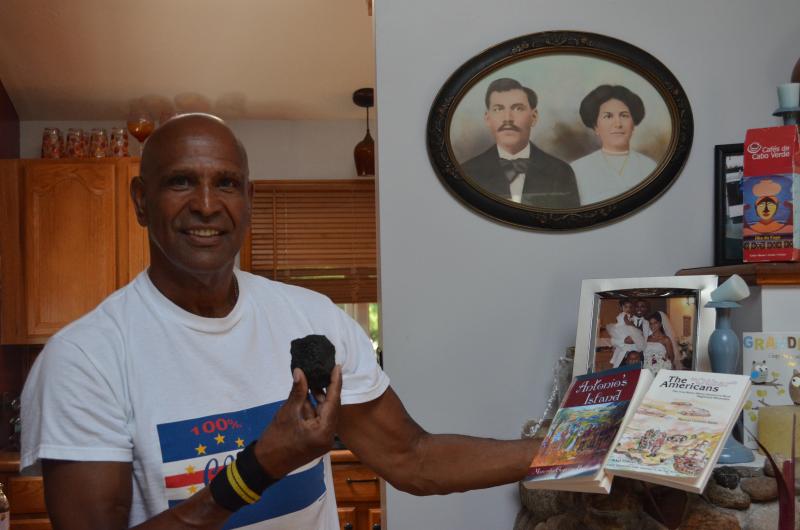'American' Cape Verdean aims to spread country's story
While the Summer of Celebration examined the past from Wareham's angle, the upcoming Onset Cape Verdean Festival invites an opportunity to look at the town in a different way.
Enter the world of Wareham native and proud Cape Verdean Phil Gomes, a retired trial court officer and auctioneer whose passion is to educate everyone he can about Cape Verdean history. He wants Cape Verdeans and non-Cape Verdeans alike to know the story of Cape Verde and appreciate the contributions the islands and their people made to world history.
His main mission, however, is to show Cape Verdeans that they can uncover the story of their own heritage.
"Our story is not a black story. It's not a white story. It’s not a brown story. It's a Cape Verdean story," said Gomes. "I want Cape Verdeans to realize that we have our own story!"
A first-generation Cape Verdean American (or American Cape Verdean, as he prefers to say), Gomes was able to uncover part of his own personal story by talking to his father, who came to America on the whaling vessel known as the Charles W Morgan. The Morgan is on exhibit in Mystic seaport, which gave Gomes something to cherish as part of his history.
Later, in 1995, Gomes was able to travel to Cape Verde as part of the 1995 Congress Caboverdianos and visit his father's childhood home. He says he will never forget his experiences there, which included meeting a childhood friend of his father's and taking a message from her on video back to his ailing father in the U.S.
"Very few people get to have this experience," he said, "but Cape Verdeans can."
Gomes was introduced to the search for knowledge of Cape Verdean history by Marcel Gomes Balla, who he saw lecture on the subject in high school and college. The lectures inspired Gomes to pursue knowledge of his own background.
Balla, a leading authority on Cape Verdean history, is the author of multiple books and texts on various aspects of Cape Verde's contribution to world history and has spent 40 years researching the subject in the archives of Spain, Portugal, Italy, and Cape Verde. He was recently honored in Italy for his efforts.
"I want to know what happened in history that created our society," said Balla, writing from his current home in Portugal. "Why are we different from everybody else? Why don't we get credit for our history? I simply want to tell the truth," he said.
Gomes and Balla now work together; while the latter lives in Portugal continuing his research, the former spreads the word to people in the U.S.
"What Marcel did was inspire me, by showing me the facts about Cape Verdean history that they didn't teach in school," said Gomes. "He was trying to get us Cape Verdeans to have some knowledge of who we are as a person."
"When I first read one of Marcel's books I had tears in my eyes," he continued. "As a kid, I would always ask questions. 'Dad, where did we come from?' and all he can say is, 'Son, all I can tell you is that I came here on a whaling vessel known as the Charles Morgan.' So what Marcel gave me was the identity of origin."
To help give this same identity of origin to schoolchildren, Gomes is developing a school curriculum with an educator in Maine called "I Am From..." which he hopes to bring to Wareham schools. The curriculum is focused on getting kids to examine their own heritage and develop an identity, which Gomes said all people have a thirst for.
Personal heritage wasn't the only thing that fascinated Gomes. He was also fascinated and excited to learn about Cape Verde's contributions to advances in the Age of Discovery, many of which were brought to light by Marcel Gomes Balla.
"You should think of Cape Verde as the black hole that created the modern world," wrote Balla.
"The Cape Verdean Islands became the centerpiece," said Gomes, in the Age of Discovery. "It was a place where you stopped to refurbish."
Due to Cape Verde's prominence in shipping and trans-Atlantic journeys, a wide variety of nationalities held a major presence there. Spanish, Italian, African, Portuguese, and various other ethnicities all shared the island.
"It was the original New York City—the first multicultural and multiracial place in the world," said Gomes.
The islands were critical to the exploits of many famous explorers and sea captains. Antonio De Noli, who discovered many of the islands, eventually became the first governor. Later the Island was a stop for Christopher Columbus on his third voyage to the Americas and was targeted by the English privateer Francis Drake in the 1500s. However, Gomes said that Cape Verde's biggest contribution to America is its people.
"From before to today, what Cape Verde contributed to America was a brand new people," he said. "The before stuff, in order to become the today America, had to have the contributions of Cape Verde and Cape Verdeans."
"This is what Marcel Gomes Balla writes about," said Gomes, "This is his history. To let us know who we are, because many of us Cape Verdeans don't know who we are. We are an invisible people, us Cape Verdeans. And there is tremendous thirst among us to know our genealogy, our history, and the impact that we had in world discovery."
"I'm honored to share that," he added.















